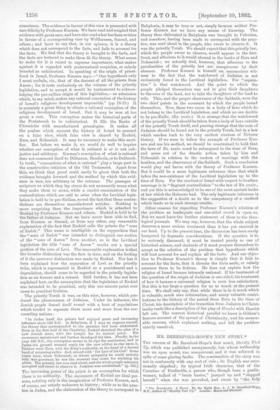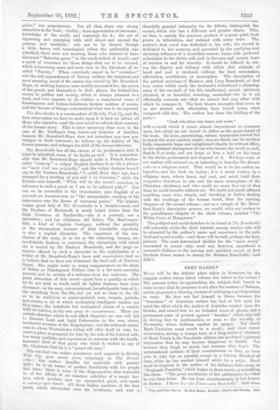MR. BERESFORD-HOPE'S NEW STORY.*
Tun success of Mr. Beresford-Hope's first novel, Strictly Tied Up, which was published anonymously, but whose authorship was an open secret, was unequivocal, and it was achieved in spite of some glaring faults. The construction of the story was not in conformity with any sort of rule ; its English was occa- sionally shipshod ; its typical Irish character, that of the Countess of Foulisville, a person who, though born a gentle- woman; talked of "brute bastes," jumped tip and "slapped herself" when she was provoked, and swore by "the holy The Bran&rethe. A Novel. By the Right Hon. A. J. B. Beresford-Hopo,, M.P., Author of "Strictly Tied Up." Loudon ; Hurst arsir Biaokett
poker," was preposterous. For all that, there was strong attraction in the book ; vitality ; keen appreciation of character ; knowledge of the world, and contempt for it ; the art of digressing and gossiping with skill about and around the persons and incidents ; wit, not to be denied, though a little heavy and tautological (when the authorship was admitted, there were not wanting those who claimed to have discerned " Batavian grace" in the much-talked of novel) ; and a spirit of reverence for those things that are to be revered, which is becoming more and more rare in the literature of so- called "Society," When everybody ceased to be "outsiders," and the soft impeachment of having written the brightest and most amusing novel of the season was owned by Mr. Beresford.- Hope, its striking features were readily accounted for, the pieces of the puzzle put themselves in their places, the behind-the- scenes in politics and society, which is always pleasant in a book, and even imparts to its readers a complacent sense of knowingness and button-holednees, became matters of course, and the flavour of things ecclesiastical what was to be expected.
The Brandreths is a continuation of Strictly Tied Up, and the first observation we have to make upon it is that we advise all those who intend to read the new novel to refresh their memory of the former story. This is more necessary than even in the case of Hr. Trollope's long drawn-out histories of families, because Mr. Beresford-Hope does not introduce any new per- sonages or fresh interests ; he follows up the history of the former persons, and enlarges the field of the former interests.
The Brandifeths has all the charm of its predecessor, and, it must be admitted, some of its faults as well. It is unpardon- able that Mr. Beresford-Hope should make a French Ambas- sador " sum-up " a vulgar English duchess in so vile a phrase as " mais c'est vac origindle," and the vulgar duchess herself say to Sir Eustace Brandreth, "I could, three days ago, have arranged for a meeting of you and I at Coniston ;" while Sir Eustace asks himself, "What will be the world's surmises, in reference to such a guest as I am to be inflicted with P" Nor can we be reconciled to the importation into English of so uncouth an Americanism as "the unassailable courtesy of his intercourse was the theme of universal praise." The typical, vulgar great lady of The Brandrethe is a .Scotchwoman, and the Duchess of Merioneth is much better drawn than the Irish Countess of Foulisville,—she is a portrait, not a caricature ; and her villainous old father, The MacCorquo- dale, a kind of Captain Costigan, without the geniality or the unconscious humour of that inimitable reprobate, is also a capital character. The vagueness of the con- clusion of the story, in so far as the scheming, uneasy, un- comfortable duchess is concerned, the abruptness with which she is routed by Sir Eustace Brandreth, and the large re- sources offered by such a character to the exploitation of a writer of Mr. Beresford-Hope's force and savoir-faire, lead us to believe that we have not witnessed the final exit of Duchess Grace. She might make as many reappearances on the stage of fiction as Plantagenet Palliser (she is a far more amusing person), and be certain of a welcome from her audience. The great attraction of this novel—apart from a quality on which we do not wish to dwell, until its lighter features have been discussed—is the easy, conversational, knowledgeable tone of ; the sketching from the life, and yet not so close to the life as to be malicious or coarse-grained, men, women, periods, and events, to all of which moderately intelligent readers can fit a name ; the indefinite but undisputed charm of a ramble with an habitue, in his own par de cownaiseance. There are certain sketches which do not affect disguise ; no one will fail to discover Lord and Lady Palmerston in the very clever, incidental mention of the Rugeleytons ; and the widowed states- man to whom Westminster Abbey will offer itself in vain, be- cause a place is prepared for him by the side of his beloved wife, has many qualities and experiences in common with the loudly- lamented chief of that party who think it wicked, to say of Mr. Gladstone that he is a "grand old man." The wit that was rather ponderous and ungainly in Stricay Tied Up, goes much more trippingly in The Brand- r keths ; the author handles his materials with greater Si ; he is on terms of perfect familiarity with his people this time; there is none of the disproportion that reminded -as of the efforts of an amateur exhibitor of a magic lan- tern, which produce now an unexpected giant, acid again a mal-a-propos dwarf. All those higher qualities of the first novel, which triumphed over its crudeness, and won a
cheerfully granted indemnity for its defects, distinguish the second, which also has a different and greater charm. This, we fear, is mainly the gracious product of a great grief, fruit grown in tribulation, and watered with many tears. The author's first novel was dedicated to his wife ; his second is dedicated to her memory, and pervaded by the purifying and elevating influence of a boundless sorrow, borne with profound submission to the divine will, and in the sure and certain hope of reunion in and for eternity. It would be difficult to con- vey the dignity and delicacy with which this attitude of heart and soul is rendered, without the least ostentation, affectation, morbidness, or assumption. The description of the perfect marriage of Eustace and Lucy Brandreth, of that true union which made the husband's widowhood a shearing- away of the one-half of his life, intellectual, moral, spiritual, physical, is so beautiful, touching, unstudied—for in it art effectually conceals art—that we cannot find any other with which to compare it. The best known examples that occur to us are tainted with affectation, have forced notes, when compared with this. The author has done the bidding of the poet,— " Look into thine own heart, and write,"
with a result which it seems almost impertinent to comment upon, but which we are bound to define as the great charm of the book. Its keen, penetrating, solemn tenderness cannot fail to touch the most careless reader; nor, we think, can its steclfast faith, reasonable hope, and enlightened charity be without effect, as the spiritual atmosphere of one who knows the world so well, depicts it so truly, and yet keeps so firm a hold on his trust in the divine government and disposal of it. We hope none of our readers will misread us, as intending to describe The Brand- nag as a religious novel. That would be to do the author an injustice, and his book an injury ; it is a novel written by a religious man, whose heart, and soul, and mind fulfil their respective functions in one and the same atmosphere of the Christian obedience, and who could no more live out of that than he could breathe without air. We could not recall offhand anything more true, simple, and touching in fiction dealing with the workings of the human heart, than the opening chapters of the second volume ; and as a sample of Mr. Beres- ford-Hope's descriptive powers, we would refer our readers to the penultimate chapter of the third volume, entitled "The White Cross of Monguerre."
The political and social sketches to be found in The Brandreths will naturally excite the chief interest among readers who will be attracted by the author's name and experience in the poli- tical and social worlds,—and these will be well, perhaps the best, pleased. The most determined stickler for the "mere novel," warranted to amuse only, need not, however, apprehend a moment's dullness in the moving and mirthful record of how Duchess Grace meant to marry Sir Eustace Brandreth,—and



































 Previous page
Previous page